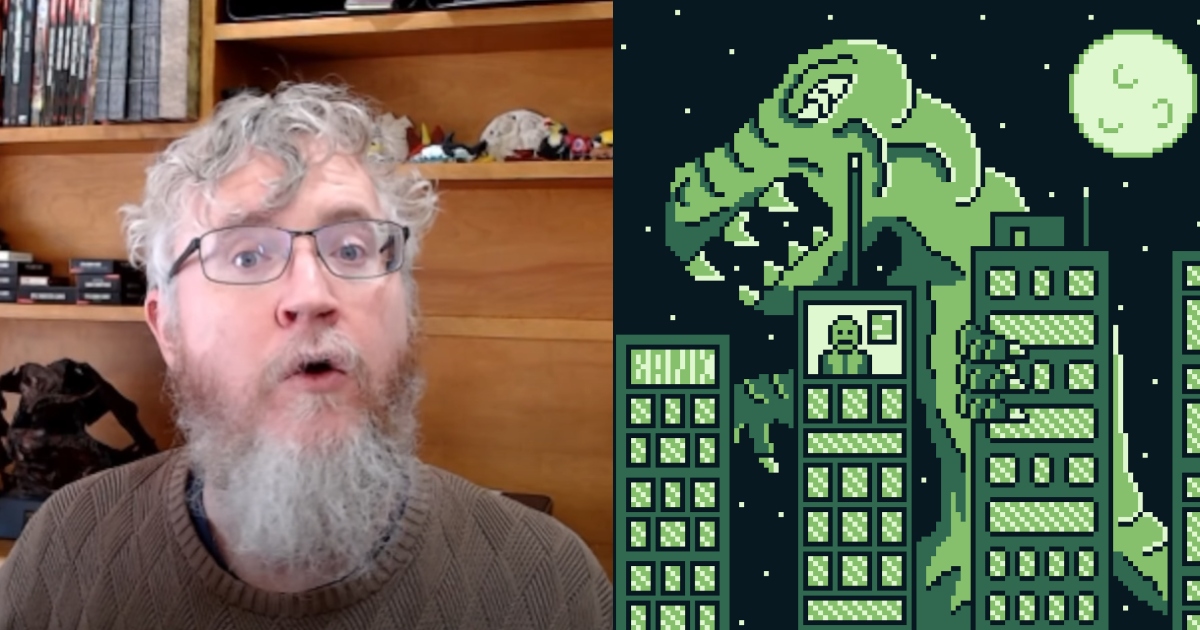Starting your own studio is a risky endeavor, whether you’re a solo developer or someone with deep pockets. Mark Darrah, programmer, consultant, and former BioWare producer, has broken down the key questions you need to answer before embarking on this adventure.

Right: Mark Darrah, Left: a pixel art monster (Image credit: Xelriz, via Pixabay)
Earlier this week, Darrah posted a nearly hour-long video on his YouTube channel dedicated to this topic. Before we go into more detail, here are the six questions a person should ask themselves before starting a video game studio:
- Why are you looking to start a studio?
- What is your studio going to look like?
- Who your are and what do you bring to the table?
- When the game is going to come out?
- Where will your studio be located and what your style of work will be?
- How are you going to work?
Speaking of “Why?”, Darrah noted that this reason should be personal and reflect what you want to bring to the industry. While there are enough examples of people starting a studio and then getting rich by releasing a global hit or then selling their company, it shouldn’t be the only reason. Making a game of your dreams may be a good enough reason, but there needs to be something else, other motivations that will keep your company afloat after that project ships.
“Understanding your ‘Why’ is going to allow you to shape the studio that you are ultimately going to form,” Darrah said.
If 'make money' is your only reason for starting a studio, it's not enough, it's not a good enough reason to start a studio. 'Make money' can certainly and probably should be part of your reasons, but it doesn't necessarily have to be. If you starting a studio as a hobby, then making money isn't necessarily very high up on your list. It's more about exploring new skills and trying a new medium of communication. Those are certainly valid reasons to start a studio. Former executive producer at BioWare
“What?” is about deciding on the size of a company and what games you want to make (indie, AA, AAA, etc.). The answer to this question defines your business and goals, including budgets, team size, burn rate, and additional funding. All of this should be thought out in advance, even if you want to make games solo.
This leads to the “Who?” question, which is about defining your own role at the studio. Maybe your biggest strength is generating ideas, or you can be a “money guy,” or you have a lot of contacts in the industry. These are all legitimate roles, but you, as a founder, should know what your primary focus is and what skills you can bring to the table. Answering this question can also help in finding team members to fill the gaps.
Darrah describes the final three questions as “tactical.” For example, “When?” is about a target release date and your burn rate (i.e. how long you can afford to keep operating). Even if you have enough money, setting the “When?” too far in the future can also result in your game becoming outdated.
In terms of “Where?”, there are three main styles of work in today’s industry: in-person, remote, hybrid. Each has its advantages, but renting an office can be too expansive and risky for a small team, while hybrid can “lead to discrepancies between different people and it is inherently unjust [in terms of communication between office and remote workers]” (per Darrah).
Last but not least is “How?”, which is about choosing an engine and other tools, as well as building processes and even thinking about things like whether you need outsourcing or pre-made assets. It is also better to decide on your target platforms and monetization early on. For example, a story-driven indie game and a live service project each need specific tools, people, and team structure. These things can also inform previous questions related to the talent you need and your own role.
And here is how Darrah answered these questions himself when founding Triage Games, a studio focused on supporting his production consulting business and offering services such as pitching, publishing support, and management (with potential game development in mind):
- Why? — Trying to find ways to improve the industry as a whole through testing different methodologies, exploring different spaces, or communicating the things that he has learned, as well as having full control over the process (without reporting to a higher-up);
- What? — Small outsourcing studio focused on production consulting (in terms of games Darrah could make, are RPGs and story-driven projects);
- Who? — At the moment, Triage Games is a one-man company (Darrah noted that he is aware of his weaknesses, including storytelling, “shaking hands” with partners, as well as art, animation, and audio skills, so these are the gaps he should ideally fill);
- When? — “Something in the one- to two-year range”;
- Where? — Online-only work because hybrid is “very dangerous” and renting an office space dramatically increases costs (despite its advantages and Darrah’s previous experience with in-person work);
- How? — Unreal as an engine, mainly because Darrah wants to focus on PC and console games and neglect platforms like mobile due to his previous experience and knowledge of making premium games without microtransactions or live services.
For more details and nuances on each question, watch the full video below.

